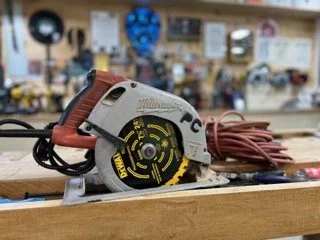ARE YOU STILL USING CORDED TOOLS?
DO YOU STILL USE CORDED TOOLS?
When I started working in Construction in 1997 in Downtown Washington, DC in remodeling, it was an indisputable necessity to use electric tools at almost all times. At this stage of my career there was no technology like there is today or social networks where we could even think cordless tools can be possible.
Later in the year 2002 some cordless tools began to be seen, but they were not efficient at all, in fact the cordless tools of that time did not last long, making acceptance amongst construction professionals very difficult. It wasn't until early 2011 that tool companies began to produce better quality cordless tools, revolutionizing the industry almost entirely.
In December 2022 we built a new house in the City of Hudson, New York. This project was completed with only cordless tools.
When it came to new construction builds, in past years we used a generator or power plant to be able to connect all the electrical tools that we used in our framing work. We also used a compressor for the pneumatic nailers making this process slower and less efficient, many times due to low and cold temperatures, the plant or generator could not be turned on, limiting our efforts to advance in our projects for example Hudson, New York December 2022, particularly in this project and due to inclement weather with extreme cold temperatures, we managed to build the whole house frame with cordless tools, Including nailers, saws, drills and some others such as LED lights for lighting and radio for jamming out during work. We also use batteries with adapters to charge cell phones and cameras to record our daily progress. With the advancement of technology and the diverse market for cordless tools, it is now much easier, safer, and more efficient to work on any project, turning these factors in the construction industry into a favorable advantage for professionals. Imagine taking a Tool Kit with a few batteries up a mountain and building something without having to bring electricity to the area. With electric tools you had to travel with enough extensions to connect each tool, as well with pneumatic nailers, enough hose for each nailer, making this process more tiring, dangerous and inefficient when working with heights at extended periods of time. Ultimately cordless tools today regardless of brand make a big difference in all areas of work, making it safer, more efficient and definitely less physically demanding.
WEIGH THESE FACTORS WHEN CONSIDERING WHAT KIND OF TOOLS TO USE ON THE JOB SITE
When considering power tools for a job site, whether to choose corded or cordless tools depends on several factors. Here are some points to consider when comparing corded and cordless power tools:
Mobility: Cordless tools offer greater mobility since they are not restricted by a power cord. This is especially beneficial in situations where access to power outlets may be limited or when working in remote areas. Cordless tools allow for greater flexibility and ease of movement around the job site.
Power and Performance: Corded tools generally provide consistent and uninterrupted power, which can be advantageous for heavy-duty tasks that require sustained performance. Cordless tools, while becoming increasingly powerful, may have limitations in terms of battery life and overall power output. For extended or demanding use, corded tools can be more reliable.
Convenience and Setup: Cordless tools eliminate the need for extension cords and can be quicker to set up and use. They are generally lighter in weight and more compact, making them easier to transport and handle. Corded tools, on the other hand, require access to power outlets and may require the use of extension cords, which can be cumbersome and add to setup time.
Battery Life and Recharge Time: Cordless tools rely on batteries, so it's important to consider the battery life and recharge time. If a job requires continuous use for extended periods, it may be necessary to have spare batteries or access to charging stations. Additionally, batteries may degrade over time and require replacement, which can be an additional cost.
Noise and Maintenance: Cordless tools tend to be quieter compared to corded tools, which can be advantageous in environments where noise is a concern. Corded tools may require more maintenance since they have brushes and cords that may need occasional replacement or repair.
Cost: Corded tools are generally more affordable upfront, while cordless tools often have a higher initial cost due to the included batteries and charger. However, the overall cost of cordless tools may be lower in the long run, considering the savings on extension cords and potential increased productivity due to mobility.
Ultimately, the choice between corded and cordless tools depends on the specific requirements of the job site and the tasks at hand. Many professionals opt for a combination of both corded and cordless tools to leverage the advantages of each type. Assess the needs of your job site, consider the nature of the tasks and execute with careful planning every step of the way.











